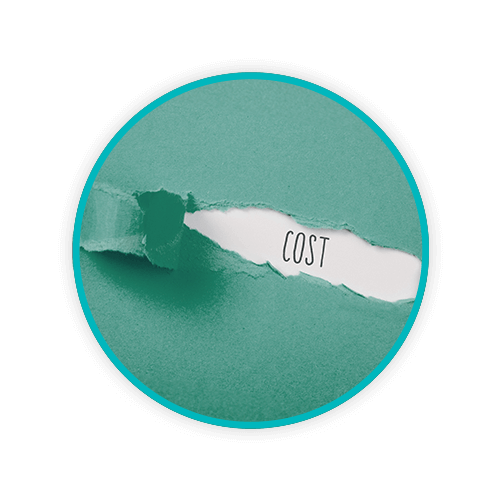Things Your Waste Service Provider Might Not Tell You

Does your waste service provider tell you everything?
Now we’re sure that whoever collects your healthcare waste is keeping you in the know as much as their provision allows, but there are some things that your waste service provider might not tell you.
And we’re not saying you’re being intentionally kept in the dark about anything, but some things just aren’t top of mind to communicate.
In any case, let’s get into it…
TOPICS WE WILL COVER:
1 / There are hidden costs to non-compliance.
2 / The best service will be tailored to your needs.
3 / It's time to update your waste policy.
4 / Your waste training needs improvement.
5 / This is what happens to your waste after treatment.
6 / Here's how you can achieve your goals and targets.
7 / How to ask your waste service provider what they’re not telling you.
8 / Looking for guidance with your healthcare waste?
9 / Skip the longer read: Blog summary.
There are Hidden Costs to Non-Compliance
Non-compliance with healthcare waste regulations and legislation results in more than non-conformance fines – it also has broader impacts…
Health and safety impact:
Correct waste segregation goes beyond putting the right waste into the right bins – it also involves using the correct packaging, whether that’s rigid containers for sharps and related waste or bags for soft wastes.
If you’re not using safe, compliant methods for waste disposal you could be inviting needlestick injuries, manual handling problems, issues with bags splitting, infection risks, and more – compliant waste packaging is a must!
Financial impact:
On top of the standard charges and fines for non-conformance and potential legal repercussions, there are the extra costs involved with the disposal and treatment of your waste that if segregated incorrectly ends up being overtreated.
It’s too often that we see non-conforming waste end up being treated via HTI or sterilisation instead of recycling or energy-from-waste because a small amount of waste contaminates a large volume.
Just think, if you throw one clinical orange waste sack into the waste hold bin filled with offensive waste, the whole lot is now deemed infectious and must be disposed of via high-carbon treatment methods.
What a waste…
Environmental impact:
The difference between waste treated via high-temperature incineration and alternative treatment is hundreds of kilos of CO2 per tonne of waste treated.
Overtreated waste results in too much carbon generated and removes the potential good outcomes for the waste. It eliminates any recycling or energy benefits that you could gain.
But what do these numbers and statistics mean in real-world terms?
The NHS in its entirety as an organisation has a target to achieve Net Zero and incorrect segregation will make it more difficult to reach those goals on time.
Incorrectly mixed waste also makes it harder for us as service providers to ensure the most efficient and sustainable environmental journey for the waste produced.
The key takeaway is that correct segregation of healthcare waste is crucial, as is using compliant packaging methods. Otherwise, you’ll end up producing more waste, spending more money, producing more carbon emissions and putting more people at risk.
The Best Service Will be Tailored to Your Needs
Waste management CANNOT be a cookie-cutter process, there is no one-size-fits-all option if you want safety and efficiency from your waste disposal service.
Each NHS Trust needs a well-defined strategy customised to the specific needs of its facilities and clear objectives defined at the outset.
Every waste management strategy should also cover the five areas of need:
- Safety
- Sustainability
- Efficiency
- Compliance
- Education
When your strategy meets those five key areas you’ll find that your waste management leads to:
- A safer environment for staff and patients.
- A reduction in waste volumes and CO2e.
- An improved allocation of costs, labour, and time.
- A more compliant waste management system across your site.
- A highly skilled workforce with a strong knowledge of best practices.
All you need is a well-defined strategy with clear objectives, realistic project timelines, and resource allocations.
It’s Time to Update Your Waste Policy
When was your waste policy last updated? Has anyone asked about it? Has anyone recommended that you update it?
A solid waste policy needs to be up to date in line with changing healthcare regulations and NHS Clinical Waste Strategies – it should also align with your strategies and objectives.
Your waste policy belongs at the forefront of your organisation alongside your strategy to help provide a full picture and understanding of your Trust’s objectives.
If you nail your policy, it’ll summarise all department types and offer an overview of the waste streams produced in each department with a layout for waste holds and bin placements as well as processes for correctly handling and disposing of waste.
Staff members need to know what they’re responsible for, if they can easily check the waste policy and identify their department and the specific processes they should follow within it, it makes waste management a lot easier.
An up-to-date and well-defined waste policy will enable any member of staff to scan the summary and understand what they need to do in their specific department to deliver results within waste management.
Your Waste Training Needs Improvement
No one likes to hear that they’re lacking in a particular area but sometimes a little tough love can go a long way, especially when it’s counsel that contains value.
There’s a sad fact about the induction and training programmes that most healthcare facilities conduct – they don’t focus enough on waste management. It’s rarely viewed as important enough to make it mandatory for new staff.
A waste service provider knows this and should endeavour to provide ongoing training as well as access to educational resources and materials to raise awareness of waste management best practices.
It’s also important that they keep you and your teams up to date on changes to waste regulations and legislation.
The most common healthcare challenges faced by clinical staff are simply due to a lack of awareness resulting from inadequate waste-specific training.
This often results in inefficiencies such as negative financial and environmental impacts and can potentially make the healthcare environment unsafe, putting staff and patients at unnecessary risk.
This Is What Happens to Your Waste After Treatment…
With the route to Net Zero a prevalent feature of the healthcare industry and a large part of procurement decision-making, treatment transparency is a must.
Being informed about the environmental impact of your waste even after it leaves your site and gaining an understanding of the cradle-to-grave process of your waste is important.
If your waste is being incinerated, what happens to the bottom ash afterwards?
What happens to the alternative treatment floc* generated by energy from waste – does it end up in landfill, or is it going to an energy recovery process?
It’s important to understand the full journey of your waste, how it’s treated and the floc disposal in its entirety from beginning to end.
Take Sharpsmart’s Effluent Retention Treatment for example – this method allows us to pull out the plastics and materials (which you can't do with incinerated ash) and create a fuel.
It also put the carbon footprint of our process at around 477 kilos of CO2 per tonne of waste treated, that’s just a little over half of the carbon footprint of High-Temperature Incineration (901.29kg CO2e/tonne of waste) as outlined by the UK Government NAEI Clinical Waste Combustion + BEIS 2021 and used for NHS carbon calculations.
If you’re curious and would like to learn more about our Effluent Retention System and the impressive CO2e reductions it can help you achieve from our paper – The Effluent Retention System: A New Era in Sustainable Sharps Waste Treatment.
*Floc is the solid residue resulting from the sterilisation of waste that’s been made unrecognisable and is now a non-infectious/non-hazardous material that can then be treated via more sustainable methods.
Here’s How You Can Achieve Your Goals and NHS Targets
Some of the most pivotal information you want your waste service provider to share with you is a roadmap of exactly how you can achieve your goals and wider NHS targets within waste management.
This will depend on access to accurate data, waste trends, audits, and working to clearly defined objectives and KPIs – without having objectives and expected outcomes on behalf of both your Trust and your waste service provider, it’s hard to execute your strategy and will take longer to reach wider NHS targets.
Having access to accurate data can also give you insight into how other Trusts are performing and allow you to measure your performance against that of your peers for segregation success, carbon footprint, etc.
The risk of not having visible and accessible data with good insights puts you at risk of falling behind and being unable to make progressive data-backed decisions.
How to Ask Your Waste Service Provider What They’re Not Telling You
So, as you can see, there are several things your waste service provider might not tell you, but that doesn’t mean they won’t tell you if you ask.
If you feel you’re not being informed in any of the areas we mentioned, here are some ways you can prompt your service provider for more information:
There are hidden costs to non-compliance.
What are the consequences and true costs of non-compliance specific to my facility?
This is what happens to your waste after treatment.
What’s the next step in the process for my waste after treatment?
The best service will be tailored to your needs.
Can you customise the waste management service your providing for my facility?
Here’s how you can achieve your goals and NHS targets.
What do I need to do within waste management to achieve my goals and reach NHS targets?
What methods can I use to move waste up the waste hierarchy into more favourable positions?
It’s time to update your waste policy.
Could you help me update the waste policy for my facility?
Your waste training can be improved.
What can I do to improve waste awareness in my facility and drive better practice?
If you’re reading through this and thinking “That seems like a lot of work for me”, don’t panic. All of this should be completed or at least supported by your waste service provider – they’re there to take the weight off your shoulders and make waste management easier.
If you do feel stuck, don’t hesitate to reach out to us and we’ll be more than happy to support you with any of the above.
Looking For Guidance with Your Healthcare Waste?
At Sharpsmart, we take a partnership approach to healthcare waste management and work with you and your teams within the four walls of your facility.
We offer transparency on our service, costs, and the full cradle-to-grave life cycle of your waste with a service tailored to meet the specific needs of your facility to help you achieve your goals and broader NHS targets.
If you’re struggling to get support in the areas mentioned we can help you through the provision of our waste consultancy service, which can be delivered outside of your existing waste contract.
If you’d like help or advice with compliant, safe, and sustainable healthcare waste management, contact us today.
Blog Summary
Welcome to the short version!
Here are some (abbreviated) things your waste service provider might not tell you…
There are Hidden Costs to Non-Compliance
Non-compliance has more than a financial impact from non-conformance fines and legal repercussions, it also impacts health and safety, and the environment.
Compliant waste management including the packaging you’re using keeps staff protected and correct segregation helps to avoid the costly and carbon-intensive overtreatment of waste.
The Best Service Will be Tailored to Your Needs
Each NHS Trust needs a well-defined strategy customised to the specific needs of its facilities and clear objectives defined at the outset. It should cover the five areas of need:
- Safety – a safer environment for staff and patients.
- Sustainability – a reduction in waste volumes and CO2e.
- Efficiency – an improved allocation of costs, labour, and time.
- Compliance – a more compliant waste management system across your site.
- Education – a highly skilled workforce with a strong knowledge of best practices.
It’s Time to Update Your Waste Policy
Your waste policy needs to be up to date in line with healthcare regulations and should align with your strategies and objectives. It belongs at the forefront of your organisation alongside your strategy to help provide a full picture and understanding of your Trust’s objectives.
Your waste policy should enable any staff member to understand what they need to do in their department to deliver results within waste management.
Your Waste Training Needs Improvement
Most healthcare facilities don’t focus on waste management when training and inducting staff – waste service providers are aware of this and should endeavour to provide ongoing training as well as access to educational resources and materials.
A lack of awareness within waste management results in inefficiencies and negative financial and environmental impacts – it also puts staff and patients at unnecessary risk.
This Is What Happens to Your Waste After Treatment…
Treatment transparency is a must and being informed about the cradle-to-grave process and environmental impact of your waste even after it leaves your site is important.
Here’s How You Can Achieve Your Goals and NHS Targets
Your waste service provider should be able to give you a roadmap of exactly how you can achieve your goals and wider NHS targets within waste management.
This will depend on access to accurate data, waste trends, audits, and working to clearly defined objectives and KPIs.
Fancy reading the whole blog? Click here to head back to the top!

